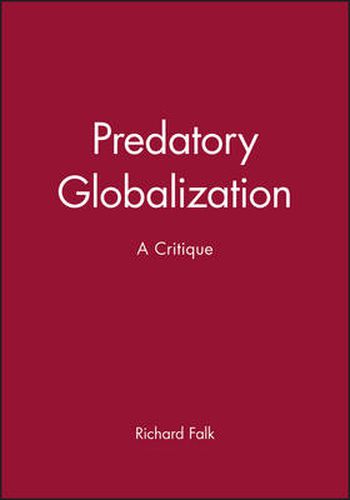Readings Newsletter
Become a Readings Member to make your shopping experience even easier.
Sign in or sign up for free!
You’re not far away from qualifying for FREE standard shipping within Australia
You’ve qualified for FREE standard shipping within Australia
The cart is loading…






Trends towards economic globalization are changing the world in fundamental respects. The author puts forward a strong case for challenging some central features of the current version of globalization, asking whether it is possible to restore the compassionate and responsible state given present global conditions. Many of the ideas currently guiding the formation of global policy are pushing states in the opposite direction, toward cruelty and irresponsibility. The author asks whether it is possible to restore the compassionate and responsible state given present global conditions. Many of the ideas currently guiding the formation of global policy are pushing states in the opposite direction, towards cruelty and irresponsibility. This applies especially with regard to the social agenda and protection of the global commons. The book contends that the fate of humanity depends crucially on how this role of the state unfolds in the decades ahead. In essence, the question revolves around whether globalization can be transformed so as to serve better the interests of the peoples of the world. The global economic crisis in the late 1990s along with the leftward swing in important countries raises hopes that a more humane globalization is a timely political project. The analysis in this book offers a framework and vision for just such an undertaking, and especially for the re-empowerment of the state so that it may better serve the wellbeing of its citizens, and, indeed, of humanity overall.
$9.00 standard shipping within Australia
FREE standard shipping within Australia for orders over $100.00
Express & International shipping calculated at checkout
Trends towards economic globalization are changing the world in fundamental respects. The author puts forward a strong case for challenging some central features of the current version of globalization, asking whether it is possible to restore the compassionate and responsible state given present global conditions. Many of the ideas currently guiding the formation of global policy are pushing states in the opposite direction, toward cruelty and irresponsibility. The author asks whether it is possible to restore the compassionate and responsible state given present global conditions. Many of the ideas currently guiding the formation of global policy are pushing states in the opposite direction, towards cruelty and irresponsibility. This applies especially with regard to the social agenda and protection of the global commons. The book contends that the fate of humanity depends crucially on how this role of the state unfolds in the decades ahead. In essence, the question revolves around whether globalization can be transformed so as to serve better the interests of the peoples of the world. The global economic crisis in the late 1990s along with the leftward swing in important countries raises hopes that a more humane globalization is a timely political project. The analysis in this book offers a framework and vision for just such an undertaking, and especially for the re-empowerment of the state so that it may better serve the wellbeing of its citizens, and, indeed, of humanity overall.